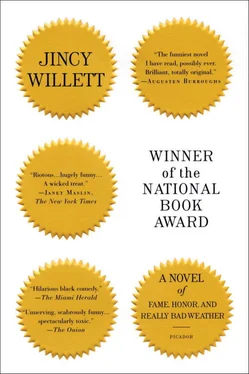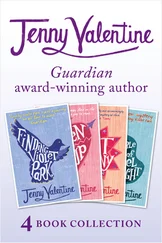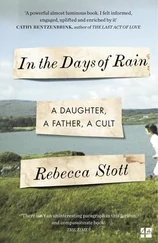This probably has something to do with the tradition of overcrowding, of living cheek by jowl for two hundred years. Whatever the cause, we have no stage presence at all, no Southern theatrics, Midwestern irony, Western hyperbole, New York cynicism. We don’t even have the famous and overrated Maine understatement. We have instead an Unfortunate Manner.
We literally don’t know how to act. We have no roles to play. We are the nakedest of Americans, and when native strangers, themselves naked and ashamed, make even innocuous demands of us—How much is this? Would you please get off my foot?—we panic and writhe, we shamble and fumble with our buttons, we mutter even as we back away. We make inappropriate noises. I’ve seen man-on-Weybosset-Street interviews on TV, and they’re really too painful to watch. A stout woman with anxious haunted eyes, asked for her New Year’s predictions, blurts, “I think we’re going to have World War III!” and giggles like a toddler. She stands for all of us, an awkward cipher, silly or rude, or silly and rude, and inside, clearly glimpsed in the frightened eyes, some poor trapped soul screaming for help.
Our body language, of course, is wonderfully complex. We know a thousand different shrugs.
We are so lonely here, with only our loved ones for company. We kill, maim, insult our loved ones, or dream of doing so, to keep from going mad. And then disaster strikes. God, how we love disaster.
Let the storm come and flatten us, please, let the poor riot, let our houses burn (we have a terrific arson rate), let our president fall, our spaceships explode. What we wouldn’t give for an LNG holocaust or a freeway sniper. Anything. I used to think we were just a big bunch of cowards, but that isn’t it. We panic early, and we panic hard and long; but we love every minute of it. Rhode Island: The Panic State.
Panic frees us, to look around openly at one another. Disaster makes us friendly, in a demented opportunistic fashion all our own. We stumble toward one another, hilarious with terror, crazy with all the possibilities, like hibernating grizzlies injected with speed and shoved out into the light. We go berserk with candor. We lose it, big time, and oh, what a sweet relief that is.
• • •
Except for us Yankees, true and false (us Yankees do have stage presence), everybody waiting outside the Star was burdening the stranger on his right with the intimate details of his private life. The running theme of the conversation was “We’re really going to get it now,” and around us the wind picked up, and green maple leaves, plucked before their time, eddied in the parking lot, batted around in the smelly air as though by a bored child who, though already strong enough to rip down tree branches, had only leaves to play with for the moment.
The stranger to my right, a squat wide-rumped blonde in turquoise bermudas, asked me if I had filled my tub this morning, and I said yes, to take a bath. “You’re not saving water?” I shook my head. “You tape your windows?” No. “You here for candles? Batteries?” “I’m here for my lunch.”
Her face fell, and I felt bad about ruining her good time. She looked back up at me in a bold, speculative way. “I seen you someplace,” she said. This is what passes for polite inquiry around here.
“I’m the head librarian at Squanto,” I said.
“Nah,” she said, shaking her head. “That’s not it.”
She was distracted then when the manager opened the glass doors. We wished each other luck, my new friend and I, and then we all squeezed through the single door in discrete lumps of ten. It took great effort not to panic along with everyone else. Men and women grabbed carts and began cruising down the aisles, like contestants on that old game show where you had five minutes to load up and the one with the biggest total won.
I concentrated so hard on strolling that I got to the deli counter second, behind a ruddy, big-chested yachting type, probably from Little Compton and somehow stuck inland, who had obviously decided that cold cuts were the way to go in the coming apocalypse. Soon there was a small crowd around him, and he gave them a big show, ordering corned beef, prosciuttini, smoked turkey, even olive loaf, in thinly sliced two-pound units. No one but me resented the way he was hogging the counter and showing off his money. I ended up buying a jar each of dried beef and mayonnaise, a package of stale burger buns, and an old head of iceberg lettuce.
By the time I got to the checkout the two lines were twenty deep and festivity was at its height. Shoppers sighting bare acquaintances across the way abandoned their lines to embrace one another; and when they returned, their places remained open to receive them. Most people were giddy and riotous but here and there stood someone badly frightened by all the excitement. A tiny old woman cried and was comforted by a family of Portuguese; a pregnant teenager with a Cro-Magnon forehead and hair bleached to the color of driftwood bellowed like a steer every time someone bumped into her cart, “Quit hittin’ me, you retard!” Joe Hiltebrand, retired Frome Junior High School principal, turned around in line in front of me and addressed us. “This lady,” he said, pointing to an old woman whose elbow he held, “just has two boxes of candles. Surely we can let her in ahead of us.” We all nodded except for the cave-preggo, who said, “Fuck huh.” The line turned toward her as one. “Fuck all a youse.”
The woman in back of me, who had been talking in my ear, an academic type Not From Around Here, probably a Brown University wife, spoke soothingly to the girl, as though she were a zoo animal. “We’re all scared, dear,” she said, and so forth, carefully using monosyllables, but she didn’t get far. “Fuck you,” said the girl, and the woman Not From Around Here turned away without losing poise and whispered in my ear. “Two eloquent arguments for abortion rights, right there.” Academics always spot me for an educated woman. What is it? How can I avoid it? “I’m a nun,” I told her. She laughed unconvincingly and turned to the woman in back of her. “Isn’t it fascinating,” she said, “to see what other people buy in times of crisis? I see you’re loading up on packaged mixes. An interesting choice.” “Yeah, I guess so,” said the humiliated housewife From Around Here, who obviously wanted to shield the contents of her cart with her body. Even during Panic Time it is inexcusable to comment on someone’s groceries. We all stared rudely into the academic woman’s cart, which brimmed with wheels of cheese and bags of whole wheat flour. Miraculously, the woman sensed hostility. “Brie is the perfect hurricane food!” she said, in her too loud Midwestern voice. “It can’t spoil! It can only get runny and smelly and yummy!” “Fuck huh,” said the preggo. Indiana, Illinois, Ohio. Somewhere out there. Well, we all have to come from someplace.
I come from Rhode Island.
When I got to the library, a pane in one of the back windows was already broken, and not by flying debris, because across the double doors in front was chalked a fresh message:
Dork From Ork
By “fresh” I mean of course “new.” Some variation on the DORK theme has been scrawled on the door or the brick face every week for the last ten years. For a long time I thought it was the same kid, and all I had to do was wait for him to grow out of it. This cracked Abigail up. “It’s not one kid, silly,” she said. She said the graffiti were a local tradition, that the pink chalk was passed like a baton from one grubby little hand to the next one down. That my vandal would always be ten years old. “If you had a child, you’d know,” said Abigail, shamelessly affecting modesty, doing her famous Virgin Mother imitation.
Читать дальше












